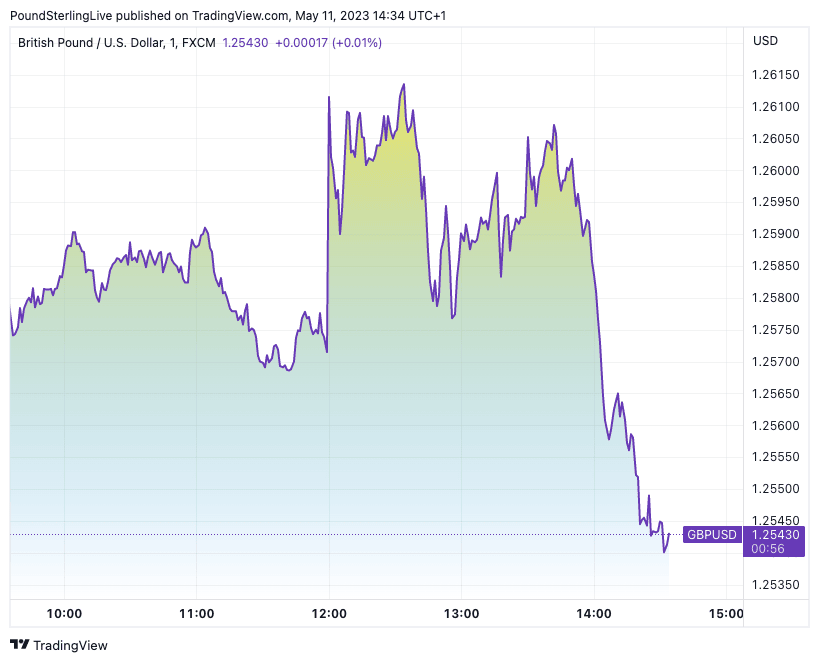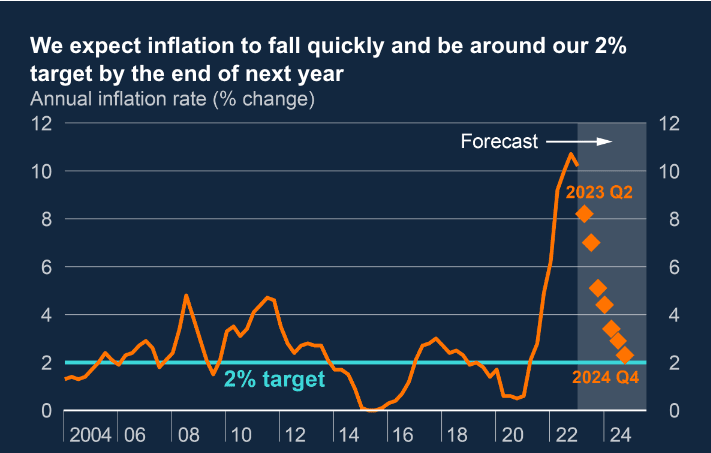Pound Sterling Surrenders Gains Following Bank of England Rate Hike and Record GDP Growth Upgrade
- Written by: Gary Howes
- GBP rose in wake of 'hawkish' Bank of England guidance
- But left exposed to a correction in wake of recent strong run
- Falling global stock markets also weigh
The British Pound rose sharply in reaction to news the Bank of England raised interest rates by a further 25 basis points and upgraded its GDP growth forecasts but ultimately surrendered the gains over subsequent hours as investors booked profit on a strong run and global stock markets fell deep in the red.
The Monetary Policy Committee (MPC) was expected to hike by 25bp, but the strength of the growth upgrade - its largest ever upward revision - signals to the market further rate hikes are in the pipeline.
The Bank said in a statement it sees a risk of persistent price and wage-setting behaviour, suggesting policymakers are increasingly wary of a potential wage-price inflationary spiral and inflation persistence could require further tightening.
"Once again their previous forecasts have proved badly wrong and we now face higher inflation, with stronger growth," says Andrew Sentance, Senior Adviser to Cambridge Econometrics and former member of the Bank of England's MPC.
The Pound to Euro exchange rate (GBP/EUR) spiked to 1.1544 in the wake of the decision before paring the advance to 1.1488 in the hours following the decision.
The Pound to Dollar exchange rate (GBP/USD) rose to 1.2610 (see chart above) before declining to 1.2543.
Declines suggest post-event fatigue with traders booking profits on the Pound's recent solid run. "A lot of the domestic good news for the UK is now in the price" of the Pound, says Shreyas Gopal, Strategist at Deutsche Bank. "Having been bullish on the pound since the start of the year, we no longer think the pound presents attractive risk-reward in the short term."
A sea of red on global markets meanwhile hoisted the browbeaten U.S. Dollar higher as investors demanded the safety the world's most liquid financial asset offers. At the same time, the Pound is typically assessed by analysts to be sensitive to times of equity market selloffs, suggesting it would come under pressure, particularly given the recent rally leaves it relatively expensive in the short term.
Analysts say markets are straining under fresh fears for U.S. banking stocks after PacWest Bancorp plunged 20% after it reported a drop in deposits last week and pledged an additional $5.1 billion of its loans to the central bank.
Nevertheless, the Bank of England's May Monetary Policy Report and guidance was by no means 'dovish', as was the case in 2022, and weakness in Pound Sterling is likely to be shallow (provided stock markets don't crater).
"It felt like GBP might sustain its gains as the economic situation in the UK is far better and the position in the GBP is far less long. The UK still has a massive inflation problem and the BoE has been on a steady pace of rate hikes with markets only expecting a couple more at most," says W. Brad Bechtel, Global Head of FX at Jefferies LLC.
Economic projections reveal the Bank now expects the UK economy to avoid a recession and sees 0.2% growth in 1Q and 2Q on an underlying basis.
The Bank cites lower energy costs, fiscal support and more confidence amongst consumers and businesses for the upgrades and estimates the real economy will be 2.25% bigger by mid-2026 than it thought in February.
In February the Bank forecast UK GDP to slump 0.7% in the year to the second quarter of 2023, but this has been revised higher to 0% in May. Back in February, GDP was projected at -0.3% in the year to the second quarter of 2024, but has since been upgraded to reflect 0.9% growth.
Inflation in the year to the second quarter of 2024 has been revised sharply higher from 1.0% to 3.4% even if it is expected to begin descending rapidly from April:
The rapid pace of rate hikes is still feeding through into the economy and some analysts - including the two MPC members who voted to keep rates on hold - fear enough has already been done to bring growth and inflation lower in the coming months. The risk, in their eye, is the economy falls into a recession because of the hike in interest rates.
The Institute of Economic Affairs warns the Bank has gone too far already, "the Bank of England helped create the inflation problem, then said there wasn't a problem, then called it 'temporary', and now runs a significant risk of overcorrecting," says Trevor Williams, Chair of the IEA's Shadow Monetary Policy Committee.
Williams cautions the Bank may be once again focusing too much on present inflation rather than long-run trends.
"The sharp reduction in the money supply points towards inflation coming down quickly over the coming two years. The UK’s sluggish economic growth, easing supply chain pressures and a series of recent bank failures also point against the need for further rate rises," he says.
If this line of thought is proven correct the Bank will find itself in a position to cut interest rates again, something that could weigh on the Pound.
"With the market still priced for at least one more hike of 0.25%, it could still be some time before we do actually see a pause. With the upgrading of growth forecasts, it’s likely a recession will be avoided in the near-term. However, the more the BoE hikes, the larger and quicker cuts maybe when they come. This should see Sterling weakness and gilt yields supported over the medium term," says Ed Hutchings, Head of Rates at Aviva Investors.
Compare Currency Exchange Rates
Find out how much you could save on your international transfer
Estimated saving compared to high street banks:
£2,500.00
Free • No obligation • Takes 2 minutes
Frances Haque, Santander UK's Chief Economist says the increase in rates has not fully passed through the economy and the arguments around waiting for the full effects to emerge is gaining ground.
"The build-up of pressure from such rate rises has a habit of suddenly turning, so a pause now might well be the appropriate response, with the option of tightening further if core inflation sticks around," says Haque.
But the Bank is clearly concerned inflation will stay higher for longer.
"Food price inflation is likely to fall back more slowly than previously expected. Alongside news in other goods prices, this explains why the Committee’s modal expectation for CPI inflation now falls back more slowly than in the February Report," the Bank said in a statement, adding:
"The Committee continues to judge that the risks around the inflation forecast are skewed significantly to the upside."
However, what is clear from the Bank of England and the economists reacting to today's events is that there is incredible uncertainty as to the future path of inflation.
For now, the Bank is maintaining its data-dependent course and this is consistent with the Pound holding onto its recent gains.
"With wages staying elevated and consumer resilience strong, the finishing line of rate hikes may still be way off," says Susannah Streeter, head of money and markets, Hargreaves Lansdown.
Compare Currency Exchange Rates
Find out how much you could save on your international transfer
Estimated saving compared to high street banks:
£2,500.00
Free • No obligation • Takes 2 minutes






